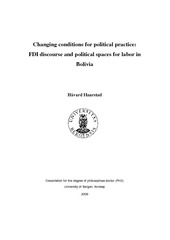| dc.contributor.author | Haarstad, Håvard | eng |
| dc.date.accessioned | 2009-10-09T10:48:40Z | |
| dc.date.available | 2009-10-09T10:48:40Z | |
| dc.date.issued | 2009-09-18 | eng |
| dc.identifier.isbn | 978-82-308-0846-7 (print version) | |
| dc.identifier.uri | https://hdl.handle.net/1956/3515 | |
| dc.description.abstract | Various authors have pointed out that the complex processes of globalization arebringing about general shifts in political practices. In particular, these processes areseen to have weakened traditional practices relating to class and redistribution, andstrengthened practices relating to identity and recognition. Organized labor seemsdisempowered by political and economic restructuring, while new social movementshave gained influence by taking advantage of emerging spaces for networking andmobility. Yet the more precise mechanisms by which globalization encouragesgeneral shifts in political practices are less clear. In this thesis I explore how thecomplex processes of globalization change conditions for political practice. In otherwords, it is held that globalization should not primarily be understood as empoweringparticular actors, such as multinational corporations, but as more fundamentalrestructurings of discourses and relationships in time and space that enable somepractices and constrain others.Taking foreign direct investment (FDI) and the discourses around it as mypoint of departure, I focus on a particular process at the center of the restructuringbrought about by globalization. FDI inflows and liberal FDI policy discourses havechanged relations between private and public spheres, and between capital, labor andthe state. I am particularly concerned with the knowledge aspect of FDI, or FDIdiscourse, how this creates conditions for political practice, and ways in which thediscourse is contested. The six papers of this thesis analyze from different angles howglobalization, in particular FDI discourse, shapes spaces for political practice; howdifferent political actors (unions, NGOs and social movements) make use of thesespaces; and how globalization, in particular FDI discourse, creates challenges for theworkplace-based politics of the labor movement. Methodologically, the thesis relieson interviews, document analysis and secondary sources.The first paper is a theoretical discussion of the socio-spatial reorganizationassociated with globalization and what this means for collective political subjectivity.The second paper shows the new potential for rescaling and networking withreference to a case in Tambogrande, Peru. The next four papers constitute the core ofthe empirical work for this thesis, and focus on the policy discourse of theInternational Monetary Fund (IMF) and civil society politics, particularly organizedlabor, in Bolivia. FDI policy implemented through the structural adjustment programsof the IMF (mid-1980s to 2006) has been instrumental in shifting political spaces fororganized labor. It has weakened collective identity formation and negotiation strategies involved in workplace politics, thereby undermining the influence of laborin gas nationalization. But restructuring has also opened spaces for other types ofclaims and articulations, which has enabled organized labor to renew its position incivil society politics and take part in contesting economic liberalization, neoliberalismand FDI. Nevertheless, there are few spaces, locally, nationally or internationally, fororganized labor to strengthen its influence in workplace politics.Together, the papers illustrate new political spaces for social movements andNGOs, a narrowing of the spaces for organized labor, and the complex interrelationsbetween socio-spatial restructuring and political practices. In returning to the questionof a general shift in political practices in the discussion, it is argued that the dominantmechanisms behind this shift are that: (1) relations of production become less centralto political articulation; (2) spaces are opened for articulation and rescaling of claimsthat resonate with hegemonic liberal discourses; and that (3) the new spaces forpolitics of scale are asymmetric. | en_US |
| dc.language.iso | eng | eng |
| dc.publisher | The University of Bergen | eng |
| dc.relation.haspart | Paper 1: Contemporary Politics 13(1), Haarstad, H., Collective political subjectivity and the problem of scale, pp. 57-74. Copyright 2007 Taylor & Francis. Full text not available in BORA due to publisher restrictions. The published version is available at: <a href="http://dx.doi.org/10.1080/13569770701246237" target="blank"> http://dx.doi.org/10.1080/13569770701246237</a> | eng |
| dc.relation.haspart | Paper 2: Political Geography 26(3), 2007, Haarstad, H.; Fløysand, A., Globalization and the power of rescaled narratives: A case of opposition to mining in Tambogrande, Peru, pp. 289-308. Copyright 2006 Elsevier Ltd. Full text not available in BORA due to publisher restrictions. The published version is available at: <a href="http://dx.doi.org/10.1016/j.polgeo.2006.10.014" target="blank"> http://dx.doi.org/10.1016/j.polgeo.2006.10.014</a> | eng |
| dc.relation.haspart | Paper 3: Geoforum 40(2), Haarstad, H., FDI policy and political spaces for labor: the disarticulation of the Bolivian petroleros, pp. 239-248. Copyright 2008 Elsevier Ltd. Full text not available in BORA due to publisher restrictions. The published version is available at: <a href="http://dx.doi.org/10.1016/j.geoforum.2008.10.003" target="blank"> http://dx.doi.org/10.1016/j.geoforum.2008.10.003</a> | eng |
| dc.relation.haspart | Paper 4: Globalizations 6(2), Haarstad, H., Globalization and the New Spaces for Social Movement Politics: The Marginalization of Labor Unions in Bolivian Gas Nationalization, pp. 169-185. Copyright 2009 Taylor & Francis. Full text not available in BORA due to publisher restrictions. The published version is available at: <a href="http://dx.doi.org/10.1080/14747730902854141" target="blank">http://dx.doi.org/10.1080/14747730902854141</a> | eng |
| dc.relation.haspart | Paper 5: Haarstad, H., 2009, Maneuvering the spaces of globalization: the rearticulation of the Bolivian labor movement. Full text not available in BORA. | eng |
| dc.relation.haspart | Paper 6: Haarstad, H.; Andersson, V., 2009, Backlash reconsidered: the interrelations between neoliberalism and popular mobilization in Bolivia. Full text not available in BORA. | eng |
| dc.title | Changing conditions for political practice: FDI discourse and political spaces for labor in Bolivia | eng |
| dc.type | Doctoral thesis | en_US |
| dc.rights.holder | Håvard Haarstad | en_US |
| dc.subject.nsi | VDP::Samfunnsvitenskap: 200::Samfunnsgeografi: 290 | nob |
